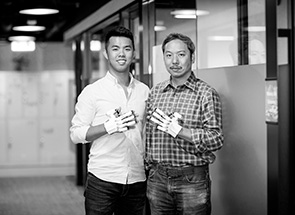“To develop accessible medical technology,” the two founders of Zunosaki, Newmen Ho and Alvin Cheung, answered in unison regarding their aspiration for developing the stroke rehab robotic hand.
Newmen used to be a university researcher in medical technology. He noticed the shortage of manpower and resources support for stroke rehabilitation in the community and that the existing assistive robotics were so bulky and pricey that only hospitals could afford, resulting in their limited application in the community. “Patients may lose their hand’s ability completely over the long wait.” In 2015, he founded a social enterprise to promote rehab technology in the community, hoping that patients would be able to recover more quickly during the critical rehab period. He was later joined by Alvin, a business management graduate who realised the social needs after a family member suffered from a stroke.
“Accessible technology” is more than a slogan. Zunosaki puts it into practice in three bearings: lightweight, user-friendly, and affordable. The robotic hand they developed, known as HandyRehab, is more people-oriented that it has a non-metallic covering and is wireless. With the help of sensors and a tablet, stroke patients are able to conduct a wide range of rehab training and be informed of the progress. To attract purchase from care centres, its price is set at under HK$100,000, which is much lower than similar products in the market. Before arriving at the current version, Newmen had built several prototypes such as robotic hand, arm and elbow whereas Alvin had given a lot of opinions on marketing, software and wearability design. “Sometimes engineers may be too obsessed with the development itself. Alvin made up for my blind spot and let me understand market needs so that I could focus on finishing the product within limited resources and timeframe.”
Alvin finds it challenging to promote innovative technology in a conservative market. To arouse the interest of care centres, they try to strike a balance in pricing and look for partners in production and sales who are also passionate about social good. “Find a team willing to work against the odds together with you. An idea in itself is not worth a dime; only ideas that turn real and work have value. Be harsh to yourself and your business. Your competitors won’t care about whether you are a social enterprise or not.”
-
The SIE Fund is funding the start-up project of Zunosaki. More details can be found here.
Profession
Scope of Services
Beneficiaries
Read more
(To be updated)
